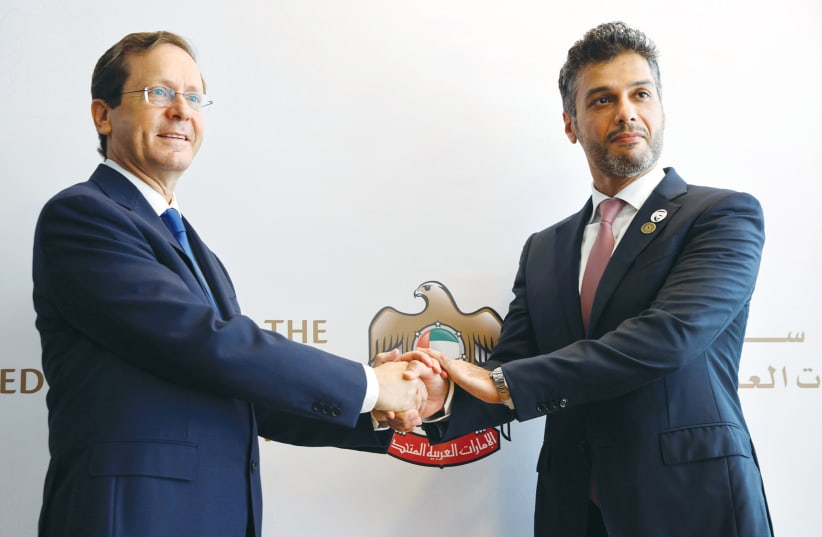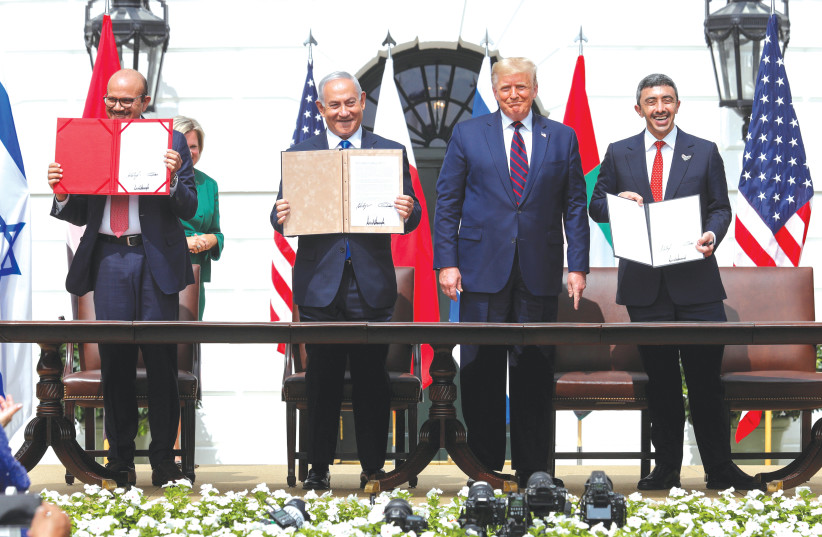While the historic Abraham Accords have led to an exciting surge in economic ties between Israel and its new Arab partners, their promise goes much deeper than bilateral business deals. The peace agreements have the potential to transform the region, creating a new Middle East corridor of prosperity, stability, and trade. 2022 will be a critical year for realizing this potential.
Since the signing of the Abraham Accords, its member countries have concluded over 127 memorandums establishing new connections and reducing barriers. These new ties have resulted in $1.46 billion in increased trade. In fact, in 2021, trade between Israel and other Avraham Accords members grew by approximately 222%.
The accords have also had a positive effect on Israel’s relations with Egypt and Jordan, with whom trade has grown by approximately 20% and 10% respectively in 2021, compared to 2019.
However, while the growth in bilateral trade is of great significance, the true transformative power of these peace agreements lies in expanding regional integration and cooperation. The Avraham Accords members will greatly benefit by taking a broader approach that unleashes the unique strengths, capabilities and requirements of each nation, and helps achieve their aspirations and goals.
Such integration could include new maritime and overland routes linking the Mediterranean and the Gulf with global markets, collaborative agricultural ventures to greatly enhance food and water security, and new energy, communications and financial platforms connecting the region to Europe, East Africa and Southern Asia.
Cross-border medical R&D and manufacturing could improve the health of millions, while enhancing the Middle East’s resilience in the face of future pandemics. Collaboration on advanced technologies could turn the region into a global hub of innovative solutions for the world’s most urgent challenges, from climate change to cybersecurity. Adopting a cooperative approach to regional tourism would help jump-start this crucial sector in the post-COVID-19 era.
Ultimately, such measures should include steps to optimize trade and overcome impediments to the flow of goods. Estimates using an approach developed by the RAND Corporation indicate that eliminating remaining trade barriers alone could increase economic activity by $315 billion over a decade for signatories to the Avraham Accords, with each signatory seeing a 3-7% increase in economic activity.
SUCH STRATEGIC initiatives were the focus of the December 8th Trade and Investment Forum convened in Abu Dhabi by the Abraham Accords Peace Institute (AAPI), a US non-partisan NGO organization dedicated to supporting the implementation and expansion of the Avraham Accords.
At the forum, decision-makers, sovereign wealth funds, business executives and representatives of the Abraham Accords countries, as well as Egypt and Jordan, came together for the first time to prioritize solutions for optimizing trade and advance far-reaching initiatives in fields such as infrastructure, investment, logistics, healthcare, food, hi-tech, energy and more.
Potential models for enhanced Abraham Accords regional economic cooperation can be found particularly in Asia, where organizations such as the Asia-Pacific Economic Cooperation (APEC) and the Association of Southeast Asian Nations (ASEAN) have contributed to the growth and an increase in intra-regional trade.
The new Regional Comprehensive Economic Partnership (RCEP), linking 15 Asia-Pacific nations of different sizes, levels of development, and systems of government, could serve as an initial model for economic partnership among Avraham Accords countries.
As the enormous benefits of this win-win regional cooperation become increasingly clear, more countries will likely join the Abraham Accords, thereby creating a virtuous circle of peace and growth.
While the Abraham Accords have the potential to transform the region, such a transformation will not happen on its own. Decision makers must focus time, energy and effort on those actions that serve to liberate the economic potential of the Avraham Accords, adopt a strategic approach which utilizes the unique contributions of each member, cut through bureaucratic red-tape, and help with integration with global markets.
Concluding government-to-government financial and investment agreements must be given top priority, and ongoing high-level forums of officials empowered to overcome remaining barriers should be established.
It is critical that such processes make substantial progress in 2022, otherwise we risk losing the positive momentum begun with the signing of the original accords in September 2020.
Realizing the full potential of the Abraham Accords will undoubtedly require great vision and investment. Fortunately, the region has shown tremendous capacity for both. Leveraging the historic agreements today will provide returns of prosperity, opportunity and stability for generations to come.
Robert Greenway is president and executive director of the Abraham Accords Peace Institute (AAPI), and was one of the architects of the Abraham Accords. Asher Fredman is director for Israel at AAPI.

